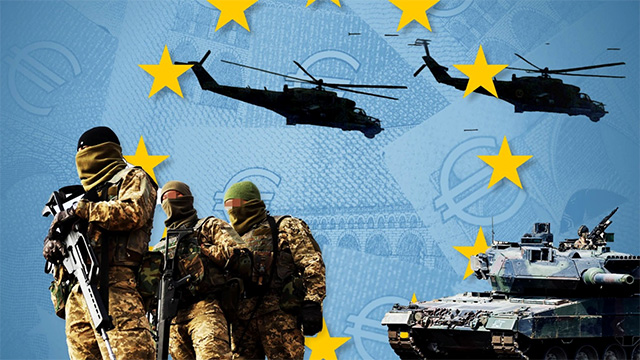 Photo: FT
Photo: FT
On July 18, the European Parliament elected German conservative Ursula von der Leyen to a second five-year term as president of the European Commission. The only candidate running, she managed to cobble together a heterogeneous ad hoc coalition consisting of her fellow center-right Christian Democrats, center-left socialists, liberals and Greens.
Despite the important gains made by the right-wing national-conservative forces in the EP elections in June largely at the expense of the liberals and the Greens, the parliamentary majority chose continuity in von der Leyen.
In terms of foreign policy, this means doubling down on the “centrist” (read neoconservative-liberal) consensus on the war in Ukraine while isolating the war skeptics on the right and the far left. The first session of the newly elected Parliament has drawn clear lines and established what appears to be a clear-cut division for the next five years, stresses ‘The Responsible Statecraft’.
First, the majority rejected a request by the far-right Patriots for Europe, led by France’s National Rally and Hungarian Prime Minister Viktor Orban’s Fidesz party to place on the plenary agenda a debate on the assassination attempt on former U.S. President Donald Trump, currently running to regain the office as the Republican nominee in the November election.
The Patriots are the main national-conservative group in the chamber and the third largest faction overall, behind only von der Leyen’s center-right European People’s Party (EPP) and the socialists. When the request was, predictably, rejected by the centrist parties (119 votes in favor, 337 against), the Patriots accused them of violating democratic norms and laying the groundwork for politically motivated violence against opponents.
To highlight the Patriots’ isolation, the main center-right group, the EPP, counterattacked by introducing a resolution on Ukraine. They were joined by other centrists — socialists, liberals, Greens — and the pro-Ukraine right from the European Conservatives and Reformists (ECR) group, the assembly’s fourth largest. The five political groups tabled a conventionally hardline joint text, demanding, among other things, the removal of any restrictions on the use of Western weapons systems delivered to Ukraine against military targets on Russian territory.
The lawmakers also “reiterated their belief that Ukraine is on an irreversible path to NATO” even though the European Parliament has no say over NATO and a number of the EU members (Austria, Ireland, Malta and Cyprus) are not members of NATO and have not shown, to date, any inclination to join it.
Reflecting the Brussels meltdown over Viktor Orban’s diplomacy that took him in recent weeks to Kyiv, Moscow, Beijing, Washington, and Trump’s Mar-a-Lago in what he called a “peace mission,” the resolution made a point of condemning him for “violating common EU positions” and failing to coordinate with other member states and EU institutions.
Lawmakers demanded “repercussions for Hungary.” While these repercussions are already being set in motion by attempts to boycott Hungary’s rotating EU presidency, no interest has been shown in engaging with the substance of Orban’s comments which he articulated in a letter to the president of the EU Council Charles Michel.
Given the degree to which Orban chose to highlight what, to be meaningful, should have been a highly sensitive and discreet diplomatic initiative, there may be reasonable doubts about its effectiveness. The problem, however, is that he is the only EU leader left who enjoys open channels of communications with the Kremlin, while the mainstream, “respectable” European leaders mostly trade in maximalist rhetoric about Ukrainian victory and Russian defeat without defining those terms, much less offering credible paths to their achievement.
The Patriots for Europe tabled an alternative motion on Ukraine that was substantially different from the majority’s resolution. While they condemned Russia’s aggression and expressed support for Ukraine’s independence and “territorial integrity within its internationally recognized borders”, they also recalled that every member state “is sovereign regarding its decisions on providing financial, military and diplomatic support to third countries.”
They also stressed their conviction that there is no military solution to the conflict and that peace is the only viable and sustainable solution. Accordingly, they urged that the parties “open diplomatic channels, with the aim of concluding a lasting peace agreement.”
The two motions exposed the unbridgeable differences in the two sides’ approach to the war in Ukraine; thus, negotiations to find a compromise proved neither possible nor desired.
As anticipated, the majority text was adopted overwhelmingly: 495 votes to 137. Amendments tabled by the Left group, designed to open the way for a diplomatic solution to the hostilities, were all rejected. This is telling: while it may have been politically unpalatable for the centrists to vote for the Patriots’ proposals, no such unofficial restrictions exist regarding the far left; thus, the rejection of diplomacy seems to be a matter of choice, not just political convenience.
While the leaders of the majority factions congratulated themselves on sending another “strong message” to Orban, not all of the lawmakers appear convinced. Michael von Schulenberg, a parliamentarian from Sahra Vagenknecht’s left leaning party in Germany and a veteran U.N. diplomat, deplored that the majority’s draft was based on “continuing and intensifying the war up to a military victory over Russia, which is now completely unrealistic.” The rejection of attempts at finding a peaceful solution, in his view, will continue inflicting “immeasurable suffering on the Ukrainian people.”
As a recent survey from the European Council on Foreign Relations showed, such views are fairly widespread among Europeans, including the voters of the mainstream political parties…
read more in our Telegram-channel https://t.me/The_International_Affairs

 12:14 26.07.2024 •
12:14 26.07.2024 •






















